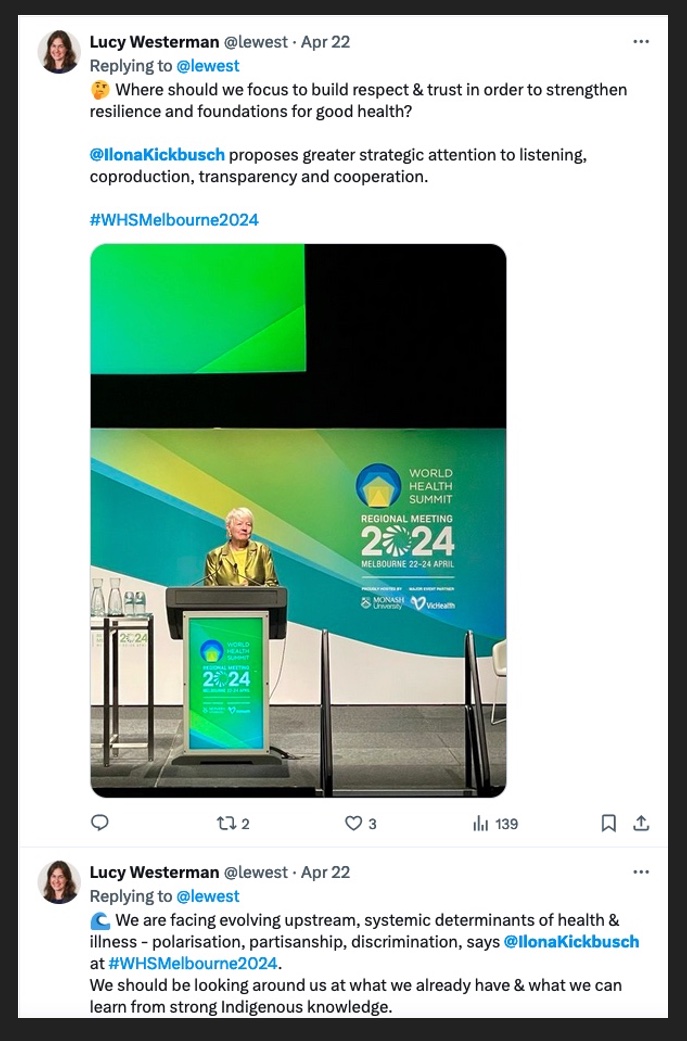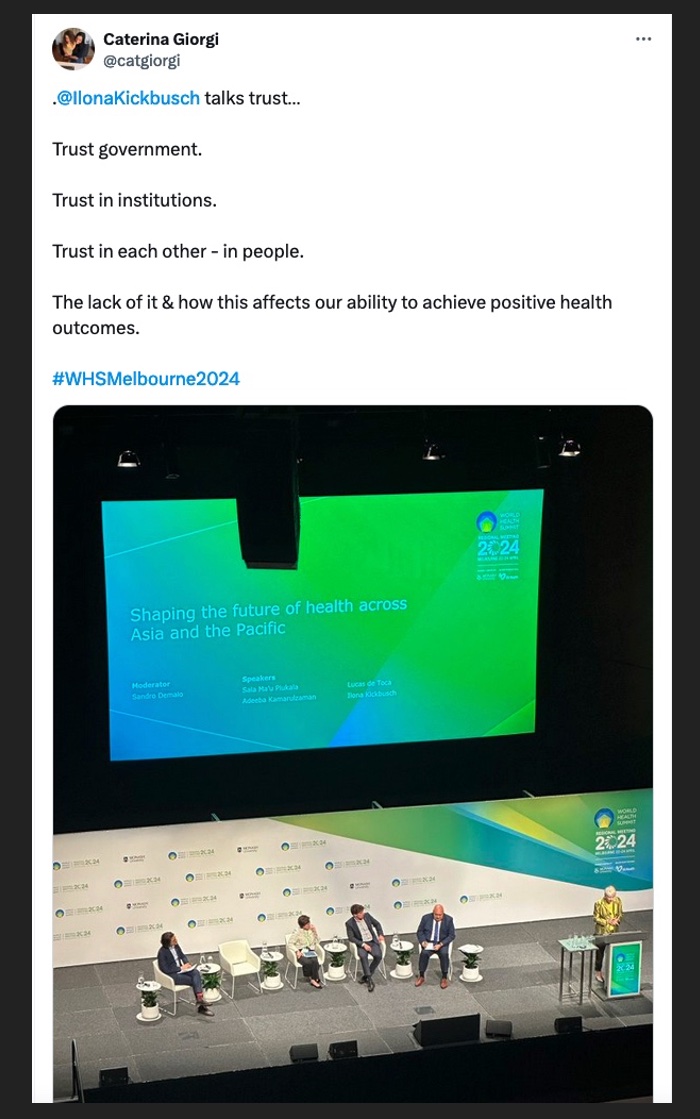A timely forum in Adelaide recently heard wide-ranging calls for action to address the digital determinants of health, with a strong focus on the need for better protections for children and young people.
Alison Barrett reports for the Croakey Conference News Service.
Alison Barrett writes:
Tougher regulations on social media, smartphones and social media platforms are critical for the health and wellbeing of children and young people, according to world-renowned public health expert Professor Ilona Kickbusch.
Speaking at a forum in Adelaide on 17 April, Kickbusch said it was shocking how little regulation applied to digital industries that had an enormous impact on young people, in particular their mental health.
She described an “enormous power imbalance between people, particularly young people, using these systems…and what the systems are able to push on them”.
“We have to really be much more systematic and clearer about the power relationships, because basically, the whole system is driven by profit-driven, under-regulated platforms,” Kickbusch said.
“From a public health perspective, [it] is absolutely shocking and irresponsible how little regulation we have in this area and what that means for the health of…the next generations.”
Kickbusch – a global health consultant who initiated the Ottawa Charter for Health Promotion and recently Co-Chaired The Lancet and Financial Times Commission on governing health futures 2030: growing up in a digital world – was speaking at a forum on Kaurna Country, titled: Navigating the Societal Digital Transformation.
The event – co-hosted by the Centre for Health in all Policies Research Translation (CHiAPRT), School of Public Health University of Adelaide and Preventive Health SA – was timely, amidst growing political momentum in Australia for a crackdown on digital platforms, heightened by concerns about their spread of misinformation and disinformation around two stabbing events in Sydney last week.
It also set the scene for discussions at this week’s World Health Summit Regional Meeting in Naarm/Melbourne, where Kickbusch joined a panel yesterday on shaping the future of health across Asia and the Pacific, and where a panel today discussed strategies for tackling misinformation and disinformation.
“We are in the middle of a major transformation” that is impacting different aspects of our lives including wellbeing, society and the world economy, Kickbusch told the forum in Adelaide.
Digital transformations – “the multifaceted processes of integration of digital technologies and platforms into all areas of life, including health” – and the growing use of social media is especially impactful on young people, she said.
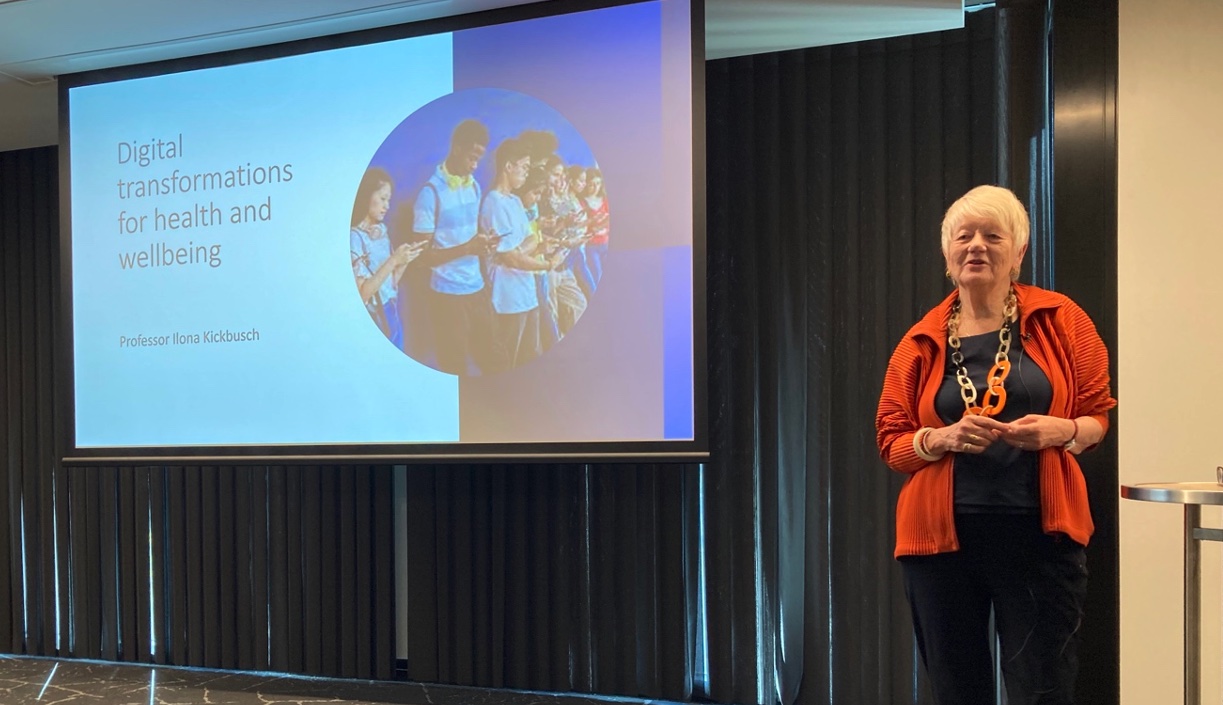
Rewiring childhood
Kickbusch backed recommendations put forward by psychologist Professor Jonathan Haidt, author of ‘The Anxious Generation: how the great rewiring of childhood is causing an epidemic of mental illness.’
Specifically, she said the three most important recommendations are raising the age of internet adulthood from 13 to 16 years, delaying the age of access to social media platforms and smartphones, also to 16 years, and restricting their use in schools.
According to Haidt, the age of “internet adulthood” was set at 13 years in the United States under the Children’s Online Privacy Protection Act of 1998 (COPPA), which prevents collection and storage of personal information from children under 13 years of age.
Most social media sites require parental consent for children under 13 years to open an account.
Haidt’s book explores the possible causes for increasing anxiety in young people over the past decade, finding it coincided with the introduction of the smartphone front-facing camera that enabled the birth of the “selfie” in 2010, according to Kickbusch, and also an era of overprotective parenting.
Haidt writes: “Let kids get through the most vulnerable period of brain development before connecting them to a firehose of social comparison and algorithmically chosen influencers.”
“Gen Z became the first generation in history to go through puberty with a portal in their pockets that called them away from the people nearby and into an alternative universe that was exciting, addictive, unstable, and – as I will show – unsuitable for children and adolescents,” Haidt writes.
Kickbusch told the forum that reducing the prevalence of social media use in people under 16 years may reduce the prevalence of its associated consequences – anxiety, low self-esteem and bullying.
Applying existing public health strategies and policy approaches that have been successful in tobacco control and car and road safety legislation could, for example, help to manage the negative impacts of digital technology, she said.
South Australia is one of the “front-runners” on related policy approaches, Kickbusch told the forum. In November 2022, the SA Government announced a ban on the use of mobile phones during school hours, saying it would align South Australia with other jurisdictions.
Most jurisdictions in Australia now have a partial or full ban on phones in schools although some researchers have questioned the evidence basis behind this policy, saying “we need a broader conversation about how all of us – children and adults alike – can use phones in a healthy way”.
Kickbusch cautioned that policies on smartphones and digital technology need to be evaluated to ensure they are making a difference to the health and wellbeing of young people.
According to a scoping review by academics from the Queensland University of Technology, which is not yet peer-reviewed, the little evidence that exists suggests that banning phones in schools made no difference in academic achievement except in disadvantaged students. The evidence for school phone bans on mental health and wellbeing is also inconclusive, the researchers found.
It is important to note that the scoping review identified only 22 studies, with a mix of study types and none that explored schools in Australia, suggesting more rigorous research is required.
Since last week’s forum, the Australian Institute of Health and Welfare released data showing that in 2023, anxiety disorders contributed to 17.1 percent of the total burden of disease in females aged 15-24 years and was the leading cause of burden of disease in this age group.
Based on self-report data from the National Health Survey 2022, young women (18-24 years) are approximately twice as likely as young men to experience high or very high psychological distress.
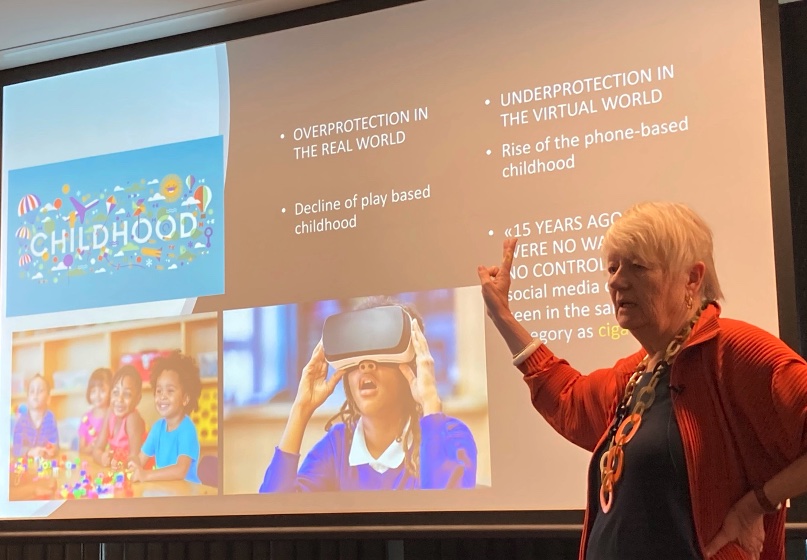
Codesign matters
Young people – generally the group of people with highest exposure to digital technologies – “are both particularly exposed to potential harms that might derive from them and uniquely equipped to shape positive health futures through codesign of digital health solutions and participatory research and decision making,” according to The Lancet and Financial Times Commission on governing health futures 2030: growing up in a digital world.
As such, Kickbusch said work continuing from the Commission is looking at advancing values-driven approaches to digital transformations while building on public health values, addressing the digital determinants of health and working with young people on digital first health systems for young people.
Interviews with young people showed that a digital system that promotes their health should be inclusive, accessible, equitable and have comprehensive protection, according to Kickbusch.
One of the key governance challenges is to address the interface between the digital and commercial determinants of health, she said, while the digital transformation should be viewed through a human rights lens.
Kickbusch also highlighted the importance of addressing related inequities. “We want to know who’s benefiting or likely to benefit from all these seismic changes that are occurring, and we also want to know who’s being left behind so that we can try and fix that,” she said.
In addition to legislation, societal norms around the use of social media and smartphones will need to change to create supportive environments, particularly for young people.
Panel takeaways
In addition to a keynote address by Kickbusch, the forum included a panel discussion with South Australian public health and policy leaders Dr Adriana Milazzo, Senior Lecturer at the School of Public Health at University of Adelaide, Brenton Caffin, Executive Director at South Australia’s Department of Premier and Cabinet, Dr Rebecca Tooher, Acting CEO of the South Australian Council of Social Services, Natasha Schranz, Mental Health Programs Manager, Preventive Health SA, Emily Jenke, CEO democracyCO and Dr Matthew McConnell, public health physician at Rural Support Service, SA Health.
The forum discussion turned to the challenges in implementing bans on smartphone and social media use when there are some demonstrated benefits of digital technology and social media including telehealth and social connections.
Kickbusch said it is not as much about the technology as about stopping forms of digital interactions that are unhealthy.
Tobacco control legislation and the associated cultural shift away from smoking “really took off” when we had data on the impact of passive smoking, particularly on children, Kickbusch said.
The community also needs to see the relevance of and reasons for the legislation, Kickbusch told the forum.
Natasha Schranz reiterated calls for evidence on the impact of the bans on mental and physical wellbeing, emphasising the importance of collaborations with the education department.
She told the forum researchers and academics should be accountable to ensure their advice and research follows the best evidence.
On the role of Big Tech and commercial determinants of health, Dr Rebecca Tooher said it is important to build a “social consensus that says you can no longer have a social licence to operate in those harmful ways”.
However, “it can’t just be left to citizens” even though they are vital for motivating change. Politicians and parliaments need to step up – “the government is our government,” she said.
Also on commercial determinants, Brenton Caffin said that commercial influences could be managed by regarding telecommunications as an essential service and strengthening consumer protections.
Energy and water – considered essential services – operate under a much stronger, although not perfect, regulatory environment than telecommunications, he said.
Trust matters
The digital transformation is also having a significant impact on trust in politicians, governments, media and the health sector, according to Kickbusch, and has helped polarise our societies.
To overcome polarisation, Emily Jenke said we need to create “conditions in which people with differing views can come together and talk about a problem”.
Our “model of communication and engagement needs to change really urgently,” she said.
This could be done with citizens’ assemblies, engaging community members, and co-developing futures and solutions, Jenke said.
The digital transformation is not an homogenous experience, said Carmel Williams, Director of the CHiAPRT. While bringing a diversity of opportunities and services, the digital divide is widening and becoming “more entrenched”.
Tooher told the forum digital inclusion means not just being able to use the digital world, but also having affordable access to it.
Regional community centres and libraries are “jumping in” to bridge the gap and provide support, she said.
Dr Matthew McConnell echoed these sentiments – while telehealth services dramatically increased at the beginning of the pandemic, enabling continuation of care for many, “for some people, it didn’t actually increase their access, depending on their local infrastructure capability”.
Dr Adriana Milazzo said for universities, the digital transformation has meant a rapid evolution of technology and online learning especially at the beginning of the pandemic.
She said universities should be innovative, incorporating interactive and flexible learning for students, while also providing digital literacy skills to students and staff, and having systems in place to identify at-risk students particularly those who predominantly study online.
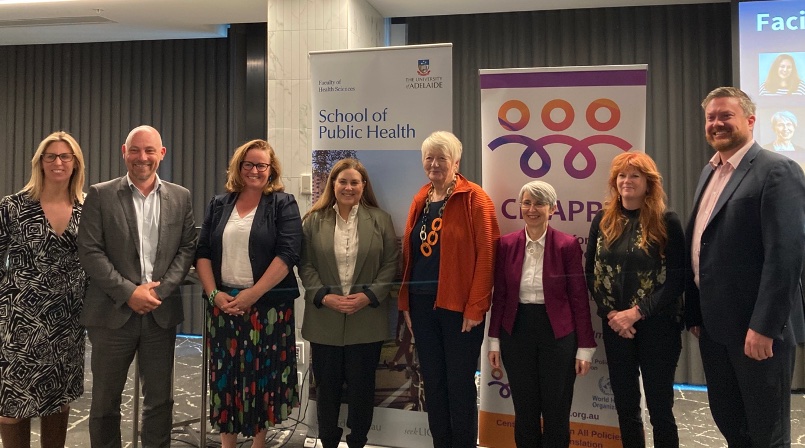
From social media


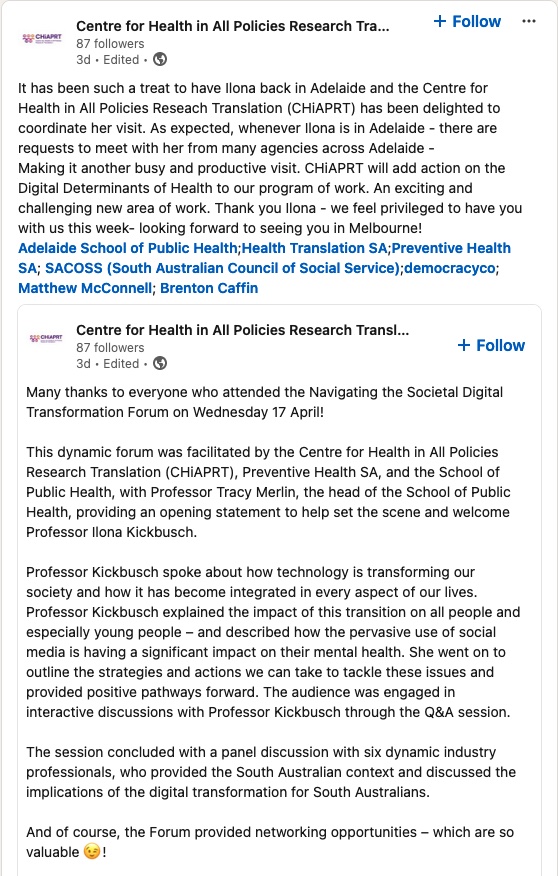

Posts from the World Health Summit Regional Meeting
Professor Ilona Kickbusch spoke in a ‘Grand Challenges plenary’ at the Summit, which is taking place in Naarm/Melbourne this week. Her insights on the importance of building clearly resonated with many participants.
